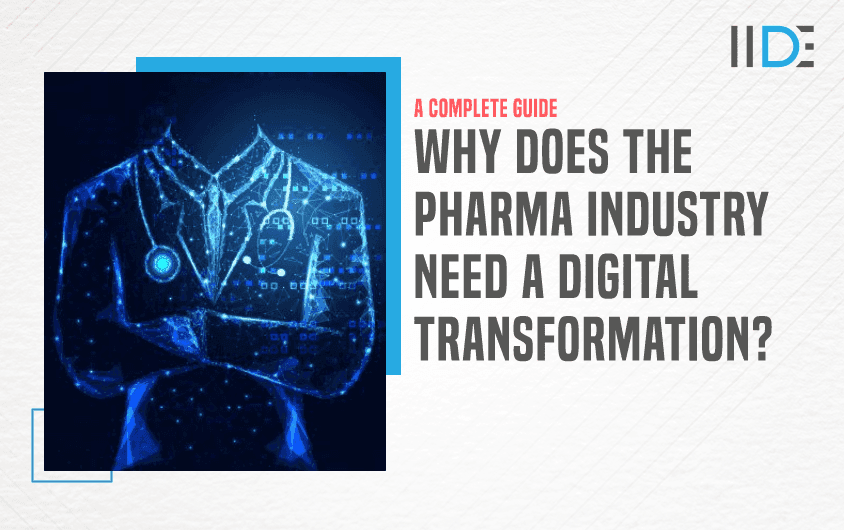Students Centric
Placements Report
Trackable results, real numbers
Reviews
Proven success, real voices
Trainers
Expert-led, Industry-Driven Training
Life at IIDE
Vibrant Spirit student life
Alumni
Successful Journeys, Inspiring Stories
Learning Centre
Webinars
Blogs
Case studies
Live, Interactive Masterclasses
Fresh Insights, quick reads
Real-life, Industry relevant
More
Hire from us
Hire Top Digital Marketing Talent
Work with us
Join Our Team, Make an Impact
Customised Training
Personalised digital marketing training for your company
Refer & earn
Simple, easy rewards
Contact us
Get the answers you need
About us
Know more about IIDE
Explore all course options
Trending
Professional Certification in AI Strategy
- Ideal for AI Enthusiast

Orginally Written by Karan Shah
Updated on Sep 25, 2025
If you’re seeking to understand all about a digital transformation in the Pharma Industry, like many others, then this blog is a great place to start with.
In this blog, you’ll learn about the meaning of digital transformation, what it entails, and what a digital transformation in the pharma industry might look like.
You will also gain an understanding of the needs of digital transformation in the Pharmaceutical industry and its significance. Along with that, you’ll get to see how Covid-19 has accelerated the process of digital transformation in the Pharma Industry.
Recommendation: Get yourself and your employees registered for this Free Masterclass on Digital Marketing Basics to start inculcating the adoption of digitalization.
So, without further ado, let’s get started with understanding what a digital transformation is for the unversed.
What is a Digital Transformation?
Digital Transformation is the process of upgrading or establishing a new way of carrying out business activities, as well as building new or adapting current business trends, culture, and customer experiences, using digital technology to meet changing business and market requirements.
Digital Transformation in simple terms is the process of restructuring or redefining the business in the digital age to match the changing trends.
The four primary aspects of digital transformation are process, technology, data, and organizational change.
And Rebuilding operations, rebuilding customer relationships, and rebuilding procedures constitute the three key components of digital transformation.
What does a Digital Transformation in the Pharma Industry look like?
In the pharmaceutical industry, digital transformation is critical for improved patient care, cost-effectiveness, greater transparency, improved production, and drug development.
The digital transformation in the pharma industry will enable pharmaceutical businesses to manufacture counterfeit-proof medications, which will guarantee the medicine’s authenticity.
Pharmaceutical businesses can comply with regulations and interact with suppliers and wholesalers via cloud-based information exchange and can also potentially use digitization to satisfy an increase in market demand.
To sustain real-time production, pharmaceutical businesses can use automation and smart sensors to analyze drug compliance and estimate demand across regions.
These are just a few ways of how a digital transformation in the pharma industry can take place.
Let’s see why a digital transformation in the pharma industry is the need of the hour.
Need for Digital Transformation in Pharma Industry
Pharmaceutical companies are trying very hard to keep up with the revolution brought about by digital technology. Mobile communications, the cloud, advanced analytics, Digital Marketing, and the Internet of Things are among the innovations that are beginning to transform the healthcare industry.
Pharma executives are well aware of the disruptive potential of digital transformations and are experimenting with a wide range of digital initiatives. Many find it challenging to decide what actions to scale up and how, as they are still unclear what digital success will look like in the future.
We are in the middle of a revolution- A digital transformation in the pharma world. The pharmaceutical sector in India is expected to grow at a CAGR (Compound Annual Growth Rate) of 12 percent from $41.7 billion in 2020 to $130 billion by 2030.
To align with this growth, pharmaceutical executives require ways to improve efficiency, uncover new business opportunities, and build better relationships with patients and prescribers. It will not be possible without a digital transformation.
Hence, in our opinion, the sooner a digital transformation is adopted, the better it will be.
The chances of catering to the future generations who will be used to everything being digital will also become better.
Now that we’ve understood the need for it, here are some benefits and importance of a digital transformation in the pharmaceutical industry.
Importance of Digital Transformation in Pharma Industry
Digital transformation can fundamentally change the way pharmaceutical companies do business. Going forward, better growth in domestic sales would depend on the ability of companies to adapt to digital marketing.
Let’s take a look at the benefits which have increased the importance of digital transformation in the Pharmaceutical Sector.
1. Ability to reach potential customers in spite of governmental restrictions
Being a regulated industry, pharma faces a lot of complexity and regulations in terms of advertising and marketing. If a proper digital strategy is worked upon, your company can reach out to the right target audience, while keeping within the framework of the law.
2. Satisfy the information requirement of customers
Pharmaceutical companies are no longer the sole provider of information about how their products work in the long term.
Recent digital transformation trends provide both patients and companies with unparalleled access to information surrounding the impact of a healthcare strategy or medical product, and how it may impact their overall well-being and daily life.
Although healthcare professionals will continue to be an essential part between the pharma industry and patients, digital trends are showing that an increasing amount of patients are looking online for medical information about products and treatments.
If you have a great digital marketing strategy in place, your company can ensure that the correct information about your drugs, products, or services reaches the people.
3. Evaluating customer’s requirements better
Digitization gives a pharma company the ability to know the customer requirements better. Tracking online forums, and analyzing data from the health apps, helps to get good feedback as to what people need.
These insights will help you create products that people need and market them to the right target audience.
4. Tracking the performance of the products
Tracking online user feedback and data from fitness apps provides a pharma company with actionable insights about the safety and efficacy of their medicine. It will ensure that both new and old pharmaceutical companies stay the primary source of authority on the performance of their product.
Check Out: Abbott’s Case Study and how we helped Abbott to build and improve its online presence.
It’s very important to stay up with the changing business and market environment. And many firms have done so by employing a number of additional digital marketing strategies. Here are some digital marketing trends to consider as part of your Digital Transformation strategy.
Now that you know what are the needs and importance of digital transformation in the pharmaceutical sector, let’s look at how Covid-19 has influenced and accelerated the pace of digital transformation in the pharmaceutical industry. During the digital transformation make sure your product complies with healthcare industry standards like HL7 FHIR server.
Impact of COVID-19 on Digital Transformation of the Pharma Industry
COVID-19 revealed a strong need for innovation and the adoption of digital tools, and it successfully demonstrated how quickly the industry can embrace changes when pushed to do so.
The COVID-19 pandemic had a wide-ranging impact on the pharmaceutical industry, delaying routine treatments, straining healthcare budgets, delaying drug development for non-COVID-related diseases, and disrupting supply chains.
To meet the challenges posed by the pandemic, the pharmaceutical industry was forced to adopt a variety of digital technologies.
According to a GlobalData survey, 35% of pharma industry professionals believe the COVID-19 pandemic has accelerated digital transformation by more than five years.

The pandemic has also changed traditional sales and marketing models, leading to increased demand for online marketing and communication tools.
Doxy.me, a renowned telemedicine platform for healthcare practitioners, reported huge growth in monthly visits, jumping from over 250,000 in February 2020 to 23.2 million in April 2020.
Cloud computing and cybersecurity technologies aided the industry in adopting remote working and conducting decentralized clinical trials.
Veeva, a provider of cloud-based business solutions for the life sciences industry, began delivering its CRM Engage Meeting tool for free in March 2020, allowing clients to stay in touch with healthcare experts.
During the week of March 16–21, 2020, this tool was used to plan over 64,000 meetings, an increase of over 275 percent over the previous week.
The pharma sector has been relatively slow in embracing digital transformation. The industry’s need to focus on a wide range of internal and external problems, such as increased R&D expenditures, medication pricing, and reimbursement concerns, increased regulatory load, patent expirations, and tax reforms, has influenced this trend.
Also Read: Growth of digital marketing during Covid-19
How can you bring Digital Transformation in the Pharma Industry?
Now, if you have read our blog on top digital marketing trends, you will get to know that any industry or organization can implement digital transformation in a variety of methods. You can get it started in-house, but if you want a more complete or advanced strategy, you’ll need to hire a professional.
This is where IIDE steps in. IIDE provides customized digital marketing corporate training for the Pharma Industry, designed by industry professionals to provide a 360° view of the digital world.
A great Digital Marketing Strategy is how any firm can succeed in a digital landscape, as we’ve learned over the past year.
We understand your company’s needs, and our corporate training program has helped organizations like Volkswagen, Abbott (one of the renowned Pharmaceutical companies), Asian Paints, L&K Saatchi & Saatchi, Mahindra & Mahindra, Cipla, and others achieve faultless digital transformation.
If you are looking to digitally transform your company, write to us for a personalized demo!
We hope that this blog has provided you with a better understanding of the importance and necessity of digital transformation in the Pharma industry.
It’s critical that you stay current with digital industry knowledge and broaden your learning horizons.
Let us know your thoughts about this in the comments section below. We would love to hear back from you.


Learn Digital Marketing for FREE
- 45 Mins Masterclass
- Watch Anytime, Anywhere
- 1,00,000+ Students Enrolled


Want to Know Why 2,50,000+ Students Trust Us?
Dive into the numbers that make us the #1 choice for career success

Courses Recommended for you
MBA - Level
Post Graduate in Digital Marketing & Strategy
Best For
Fresh Graduates
Mode of Learning
On Campus (Mumbai & Delhi)
Starts from
Mar 23, 2026
Duration
11 Months
Live & Online
Advanced Online Digital Marketing Course
Best For
Working Professionals
Mode of Learning
Online
Starts from
Mar 6, 2026
Duration
4-6 Months

Online
Professional Certification in AI Strategy
Best For
AI Enthusiasts
Mode of Learning
Online
Duration
5 Months

Offline
Undergraduate Program in Digital Business & Entrepreneurship
Best For
12th Passouts
Mode of Learning
On Campus (Mumbai)
Duration
3 Years
Recent Post
- 9 Best Courses After 12th in Jaipur 2026: Top Colleges, Eligibility & Career Prospects
- 11 Best Courses After 12th in Ahmedabad 2026: Top Colleges & Careers
- Top 10 Best Courses After 12th in Nagpur 2026: Eligibility, Top Colleges & Career Scope
- Top 15 Courses After 12th in Udaipur 2026: Best Colleges, Eligibility & Career Scope
- Top 14 Courses After 12th in Nashik 2026: Best Colleges, Eligibility & Career Scope
- Best 12 Courses After 12th in Raipur 2026: Top Colleges, Eligibility & Career Prospects
- 7 Best BBA Courses in Udaipur for 2026: Top Colleges, Fees & Career Prospects
- 8 Best BBA Courses in Raipur for 2026: Top Colleges, Fees & Career Prospects
- 8 Best BBA Courses in Nashik for 2026: Top Colleges, Fees & Career Prospects
- 5 Best Commerce Colleges in Udaipur 2026 - Fees, Scholarships, Placements & More
Digital Marketing Courses Nearby
- Digital Marketing Courses in Hyderabad
- Digital Marketing Courses in Chennai
- Digital Marketing Courses in Kochi
- Digital Marketing Courses in Cochin
- Digital Marketing Courses in Coimbatore
- Digital Marketing Courses in Trivandrum
- Digital Marketing Courses in Thrissur
- Digital Marketing Courses in Madurai
- Digital Marketing Courses in Mysore
- Digital Marketing Courses in Bhavnagar
Karan Shah is the Founder and CEO of IIDE – The Digital School, Asia’s premier digital marketing institute. With over ten years of hands-on experience in the digital marketing industry, Karan has played a pivotal role in empowering thousands of students to forge successful careers in this ever-evolving field.
His vast expertise encompasses various areas such as paid search, social media marketing, programmatic marketing, and much more. Karan's passion for education, teaching, and public speaking led him to establish IIDE, where he offers world-class digital marketing education designed to meet industry standards.
To date, he has trained over 60,000 students and worked with more than 25 corporates, sharing his knowledge through both online and offline platforms. A Harvard Business School alumnus with a specialisation in E-commerce, Karan is also an accomplished Tedx speaker. His industry insights and teaching excellence have earned him a prestigious role as a visiting faculty member at India’s top management institutes, including the Indian Institutes of Management (IIMs).